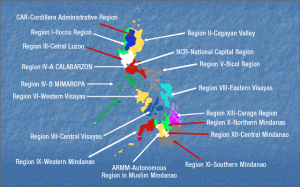Region-based Decentralization
aka “Evolving Federalism”
Empower the regions, decongest Imperial Manila.
The 1987 Constitution defines the Philippines as being a unitary state, centralized around the capital of Manila. The result has been that most economic opportunities and opportunities for quality education and self-development are concentrated around the National Capital Region, and leaving the countryside, the provinces, and other cities relatively underdeveloped.
As such, ordinary Filipinos seeking higher education or better job opportunities are forced to flock to Metropolitan Manila in order to try their luck, unfortunately resulting in the massive population congestion, higher pollution levels, sub-standard living conditions, extreme traffic jams, and high crime rate of Metro Manila. It has also caused the Philippine provinces to have to remit most of their taxes to the capital, and after aggregating the entire amount at the national level, smaller amounts are redistributed back to the local entities, giving them little incentive to develop their own local economies as whatever they produce does not exactly go straight to their own development and instead is mostly remitted back to the capital.
By allowing for evolving region-based decentralization, the different regions in the Philippines will be better empowered to take control of their own economic decision-making, giving them greater incentives to develop their economies, attract their own investors, and create local opportunities that would allow their own people to prosper while staying in their own regions without needing to migrate to the National Capital Region. Empowering the regions this way also respects the cultures, traditions, and languages of the different ethnicities found in the different regions as this devolution of powers will allow the different regions to protect their own local cultural and/or linguistic heritage.
Watch this video that talks about the concept.



No comments:
Post a Comment